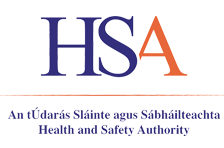Safety Alert - Passenger & Goods Lifts
 |
Installation, Operation and Examination of Passenger and Goods LiftsThis Safety Alert is issued by the Health and Safety Authority (HSA) for the attention of those who have any responsibility for the safety of lifts including employers, property managers, facility managers and lift installation, maintenance or inspection companies. The HSA is investigating the occurrence of a passenger lift failure where the lift car dropped 4 floors in an uncontrolled manner. Catastrophic failures of this type are rare but this incident and other safety issues brought to the attention of the HSA highlights the need to observe the legal obligations which apply to this type of equipment. |
Persons in ControlThe Safety Health and Welfare at Work Act 2005. [No.10 of 2005] This Act places a duty on persons who have control to any extent of a Place of Work to ensure that the means of access to and egress there from and any article provided for use are safe and without risk to health. EmployersThe Safety, Health and Welfare at Work (General Application) Regulations 2007. [S.I.No.299 of 2007] These regulations place a duty on all employers responsible for the operation of lifts to ensure:
(These thorough examinations should not be confused with normal maintenance activities). Those responsible for the operation of lifts should ensure that they have a current report of thorough examination. They should also be in possession of a log-book where details of any repairs or checks have been recorded. Operators should also be satisfied that the lift has been installed in compliance with the European Communities (Lifts) Regulations 1998 to 2008, or the European Communities (Machinery) Regulations as appropriate. Where operators have concerns with the installation, they should obtain the services of competent installers to carry out appropriate examinations and tests. InstallersThe Safety, Health and Welfare at Work (Construction) Regulations 2006. [S.I.No.504 of 2006] The installation and commissioning of a lift comes within the scope of these Regulations and the Client is obliged to appoint a competent Project Supervisor for the Design Process (PSDP) and a competent Project Supervisor for the Construction Stage (PSCS). Maintenance and User Manuals along with Final Inspection records and EC Declarations of Conformity should form part of the safety file submitted to the Client on completion of the construction project. Project supervisors need to take account of the EU Lifts Directive 95/16/EC as amended by the Machinery Directive 2006/42/EC, which is transposed into Irish law by the European Communities (Lifts) Regulations 1998 to 2008. Information on the detailed legal requirements will require reference to the text of the Directives. Note: Some lift installations may be subject to the Machinery Directive rather than the Lifts Directive. The European Communities (Lifts) Regulations 1998 to 2008. [S.I. Nos.246 of 1998 and 406 of 2008] Requirements exist for the design, certification, marking, installation and testing of lifts before they can legally be put into use. Conformity assessment procedures have to be followed which include the use of notified bodies. Notified bodies are legal entities appointed under European legislation for the purposes of conformity assessment under specific Directives. Lift suppliers and installers need to be able to demonstrate that they are in compliance with these requirements including their use of Notified Bodies. (Note there is generally a notified body associated with the lift design/manufacture and a notified body associated with the installers of the lift). Competent PersonsCompetent persons carrying out inspections/thorough examinations in addition to their normal inspection should pay particular attention to the following:
It is also required that the competent person undertaking the thorough examination should assess the need to have the safety components (referred to in Annex 4 of the Lifts Directive) tested. Follow UpIf you are in control of or have responsibility for a passenger or goods lift you are advised to check that your installation meets the necessary requirements. The HSA will in the coming months be conducting inspections of premises which operate passenger and goods lifts, checking in particular for installation certificates and 6 monthly “reports of thorough examination”. References:Irish legislation can be accessed at www.irishstatutebook.ie European Directives can be accessed at http://eur-lex.europa.eu/en/index.htm
5.9.2011 |
